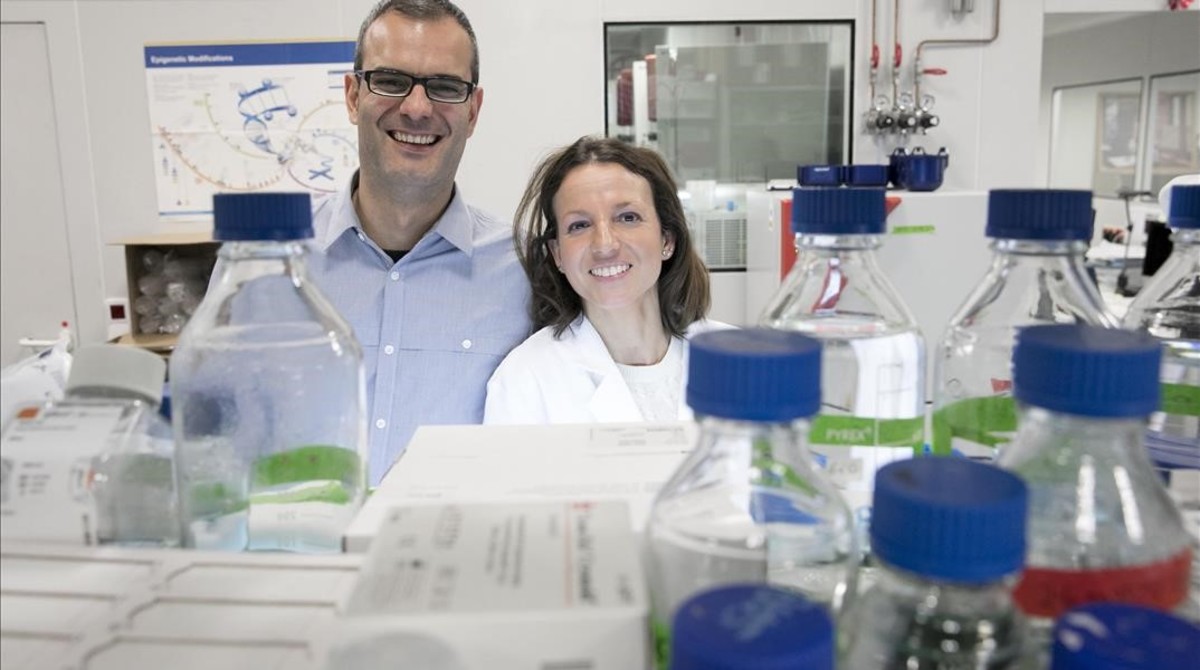Grifols es el Primer Accionista de la Biotecnológica .
Cinco Dias // Madrid .
La Española TiGenix vuelve a abordar su salto al Nasdaq .
Más de año y medio después de que Grifols, su primer accionista con algo más del 19% de las acciones anunciara su intención de llevar a cabo la operación, la empresa anunció el martes que volverá a intentar su debut en el mercado bursátil estadounidense.
De esta forma, la empresa especializada en tratamientos con células madre recupera una operación que tuvo que dejar en el cajón la pasada primavera. Entonces, la firma aplazó su salto al Nasdaq por las condiciones del mercado, según informó la compañía. Registró ayer en la SEC, el equivalente a la CNMV en EE UU, un formulario de registro que todavía no es efectivo pero que ya avanza algunas de las características de la operación.
TiGenix informó ayer que el objetivo es situar en el mercado estadounidense 2,75 millones de American Depositary Shares (ADS), representativas de 55 millones de acciones ordinarias. Estos títulos equivaldrían en torno a un 27% del número actual de acciones de la compañía, que cotiza en el selectivo Euronext de Bélgica. Cada una de dichas ADS representa el derecho a recibir 20 títulos ordinarios.
Por el momento se desconoce la fecha y las cantidades que el grupo desea percibir por la operación. Según figura en su comunicado, el precio final de cada ADS se determinará tras el proceso de prospección. La empresa cuenta con Bank Of America Merril Lynch, Cowen and Company, Cannacord Genuity y BTIG para llevar a cabo la operación.
...
LA FDA HA LEVANTADO LA SUSPENSIÓN CLÍNICA DEL ADC MÁS PROMETEDOR COMO POSIBLE TRATAMIENTO SMALL CELL LUNG CANCER TANTO PARA PRIMERA LÍNEA , MANTENIMIENTO , SEGUNDA LÍNEA ... POR LO QUE IFINATAMAB DERUXTECAN DE MERCK Y DAIICHI CONTINUA CON PASO FIRME Y ACELERADO HACIA SU MÁS QUE PROBABLE APROBACIÓN Y PODER APORTAR A LOS PACIENTES VIDA Y ESPERANZA DONDE EL RESTO DE TRATAMIENTOS NO LLEGAN .
08 diciembre 2016
Small Cell Lung Cancer . ATLANTIS Trial: Phase III Study of PM01183 / Doxorubicin vs. CAV or Topotecan in SCLC after One Platinum-Containing Line Anna Farago, Massachusets General Hospital, USA .
 (By JALO).- WCLC 2016 // December 7 .-
(By JALO).- WCLC 2016 // December 7 .-ANNA FARAGO, MD, PhD Massachusetts General Hospital will be at poster session Presenting the ATLANTIS Clinical Trial on 2nd Line SCLC with PhrmMar PM01183 .
Background:
PM01183 (lurbinectedin) is a new anticancer drug that blocks trans-activated transcription, induces DNA double-strand breaks and modulates the tumor microenvironment. Synergism in combination with doxorubicin with compelling overall response rates (~67%, including approximately 10% complete responses) was reported in a phase I expansion cohort in 21 second-line SCLC patients (pts) (ASCO 2015, abstract 7509). The most common toxicity observed was hematologic.
Methods:
Multinational, multicenter (>150 sites), open-label, randomized, phase III study of PM01183/doxorubicin vs. a control arm with investigator choice of either standard CAV or topotecan (1.5 mg/m[2], D1-5 q3wk).
A total of 600 pts will be randomized (1:1) and stratified according to ECOG performance status (PS), chemotherapy-free interval (CTFI), known CNS involvement, prior PD-1/PD-L1 based immunotherapy and potential investigator’s control preference. Patients with clinical benefit after 10 cycles of doxorubicin containing-combination will continue on single agent PM01183 or CV, until PD or unacceptable toxicity.
Interim safety analysis will be performed after 150 pts by an independent data monitoring committee. The most relevant inclusion criteria are: pts =18 years old; confirmed diagnosis of SCLC (small-cell carcinomas from unknown site are eligible provided =50% Ki-67 expression). One prior platinum containing regimen is mandatory (additional immunotherapy is allowed provided that it was not given in combination with CT); PS: 0-2 and adequate major organ function, including normal LVEF =50% at baseline. Pts are excluded if pre-treated with PM01183, doxorubicin or topotecan; symptomatic or steroid requiring CNS involvement or any serious medical condition that might preclude safe compliance with study treatment.
The primary objective is to determine a difference in progression-free survival by an independent review committee. Secondary endpoints are overall survival, survival rates at 12/18/24 months, antitumor response (RECIST v1.1), duration of response, QoL, safety, subgroup analyses and pharmacokinetics (PK) of PM01183/doxorubicin arm.
First patient is planned in JUL2016. Enrollment is expected to be completed by 4Q17.
********************************
More Information :
Administrative Data | |
|---|---|
| Organization name | PharmaMar |
| Organization study ID | PM1183-C-003-14 |
| Sponsor | PharmaMar |
| Health Authority | United States: Food and Drug Administration |
| Health Authority | Lebanon: Ministry of Public Health |
| Health Authority | Hungary: National Institute of Pharmacy |
| Health Authority | Canada: Health Canada |
| Health Authority | Czech Republic: State Institute for Drug Control |
| Health Authority | Austria: Austrian Federal Office for Safety in Health Care |
| Health Authority | Belgium: Federal Agency for Medicines and Health Products, FAMHP |
| Health Authority | Brazil: National Health Surveillance Agency |
| Health Authority | Portugal: INFARMED, National Authority of Medicines and Health Products, IP |
| Health Authority | Spain: Agencia Española de Medicamentos y Productos Sanitarios |
| Health Authority | Greece: National Organization of Medicines |
| Health Authority | United Kingdom: Medicines and Healthcare Products Regulatory Agency |
| Health Authority | Germany: Federal Institute for Drugs and Medical Devices |
| Health Authority | Italy: The Italian Medicines Agency |
| Health Authority | Bulgaria: Bulgarian Drug Agency |
Las Grasas favorecen la metástasis de las Células Tumorales .

Los ratones con una dieta rica en lípidos sufren más el proceso y de forma más agresiva.
La investigación se ha realizado en el Institut de Recerca Biomèdica de Barcelona .
Miércoles, 7 de diciembre del 2016 .
Alrededor del 90% de las muertes por cáncer se producen por culpa de las metástasis, proceso que acontece cuando una célula cancerosa se desprende de un tumor, viaja por el sistema circulatorio o linfático y acaba formando tumores en partes distantes del cuerpo. Ahora, investigadores del Institut de Recerca Biomèdica de Barcelona (IRB Barcelona) han identificado las células responsables de iniciar este proceso, que al parecer es común a todos los tipos de tumor, y han comprobado en pruebas 'in vivo' con roedores que el mecanismo se acelera cuando en la dieta aumentan los niveles de grasa.
"Si cortas el suministro de grasas en las células que generan metástasis, son prácticamente incapaces de desarrollarla", afirma el coordinador del trabajo, Salvador Aznar Benitah, investigador ICREA de la Generalitat y jefe del grupo Células Madre y Cáncer del IRB Barcelona. "Quizá seguirá creciendo el tumor, pero hará muchas menos metástasis o no hará", insiste.
Los detalles de la investigación se han publicado en la revista 'Nature', con Gloria Pascual como primera firmante.
Alrededor del 90% de las muertes por cáncer se producen por culpa de las metástasis, proceso que acontece cuando una célula cancerosa se desprende de un tumor, viaja por el sistema circulatorio o linfático y acaba formando tumores en partes distantes del cuerpo. Ahora, investigadores del Institut de Recerca Biomèdica de Barcelona (IRB Barcelona) han identificado las células responsables de iniciar este proceso, que al parecer es común a todos los tipos de tumor, y han comprobado en pruebas 'in vivo' con roedores que el mecanismo se acelera cuando en la dieta aumentan los niveles de grasa.
"Si cortas el suministro de grasas en las células que generan metástasis, son prácticamente incapaces de desarrollarla", afirma el coordinador del trabajo, Salvador Aznar Benitah, investigador ICREA de la Generalitat y jefe del grupo Células Madre y Cáncer del IRB Barcelona. "Quizá seguirá creciendo el tumor, pero hará muchas menos metástasis o no hará", insiste.
Los detalles de la investigación se han publicado en la revista 'Nature', con Gloria Pascual como primera firmante.
Suscribirse a:
Comentarios (Atom)


